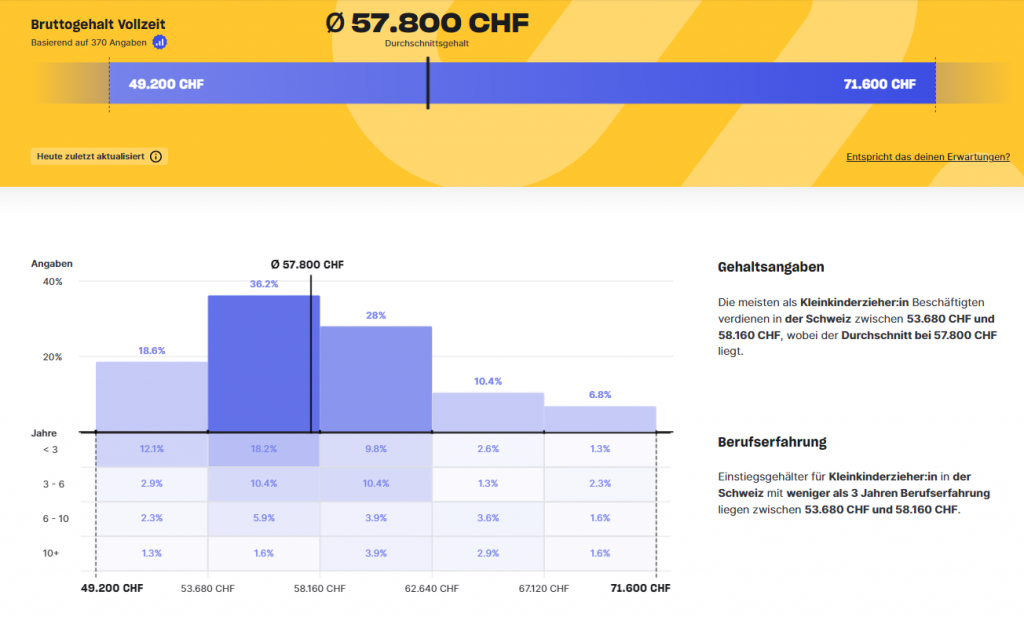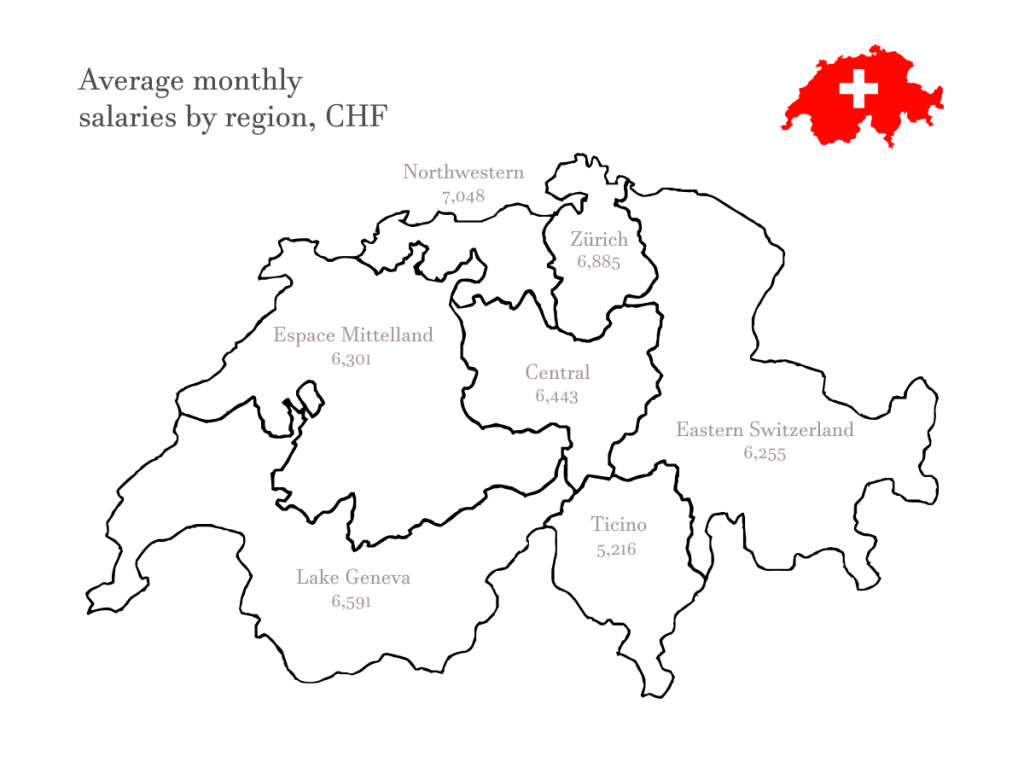Life planning without reasonable salary expectations is practically impossible. The fear of getting stuck with an underpaid job is especially strong among recent graduates whose careers are just starting. If you are looking for Kita jobs in Zurich and want to know how competitive their pay is, our insights will help you make an educated decision.
Let’s begin by looking at the salary averages in the childcare industry and factors like experience and work roles that affect financial compensation. Then, we’ll explore the benefits daycare jobs can offer. Finally, we recommend checking out our advice on how to find the right Kita employer. That’s a lot of info to unpack, so stay tuned!
Are Kita Jobs in Zurich Well-Paid?

Source: Freepik
Switzerland is famous for its high wages and high cost of living. So, do daycare jobs pay enough to afford to live in such an expensive city as Zurich? The short answer is yes, but you need to analyze several aspects to reach the same conclusion. We’ll start by explaining the tricky details of the Swiss labor code and then look at the factors that significantly affect the amount you get.
🧮 Average numbers
Based on the data from the Swiss Federal Statistical Office, the average Swiss salary is CHF 79,980 per year (CHF 6,665 monthly). Now, when we looked for information about childcare jobs specifically, we considered data from sources like Lohnrechner, Entsendung, and Kununu. On average, the annual salary of a childhood educator in Switzerland is close to 58,000 francs.

Source: Kununu
This estimate accounts for the significantly smaller salaries of the interns (experience is crucial for getting a high salary). Working a daycare job without training, you can expect your annual payout to be between 39,000 and 53,000 francs, although there are Kitas that try to take advantage of their interns. You deserve competitive pay, and asking the right questions during an interview will help you ensure fair working conditions. These are nationwide calculations, and the numbers between cantons can be slightly different.
🪙 Minimal wage
Unlike many other countries, Switzerland doesn’t have any federal minimum wage requirements. At the same time, several cantons have decided to implement salary floors independently. Zurich City (but not the canton) became one of them in 2023, with the minimum hourly wage at CHF 23.90. However, there is a very significant caveat—this law doesn’t apply to internship and apprenticeship positions. Unfortunately, this means that almost 1/3 of daycare employees won’t benefit from the changed law.
🎄 13th-month payment
The 13-installment pay system in Switzerland is a common but not compulsory practice. Usually, this additional installment is paid out in December, which is why many see it as a holiday payment. This system can help with financial planning, but it doesn’t bring any tangible benefit, as the extra installment is taxed in a regular manner.
Now that you know the nuances of the Swiss payment system, let’s look at the factors that influence the amount a childcare job in Zurich can earn.
Experience

Source: Freepik
Experience is by far the most important factor that affects your salary in Switzerland. The seniority principle is fundamental in Swiss employment culture. Stability and long-term orientation hold enormous value. Employees who work in the industry for an extended period receive recognition in the form of salary increases and additional benefits.
In the daycare industry, completing an internship and apprenticeship takes about 3.5-4 years. After that, you become a certified childcare specialist and can almost double your earnings. It is also important to know that your salary will continue to rise as you accumulate work experience and undertake more complicated work roles.
Work Role
When you scroll through Kita job search platforms, you can see many job titles, including childcare specialists, daycare educators, co-educators, or group leaders. Their functions often overlap, so we recommend evaluating them by job descriptions, not just job titles. Of course, a playgroup leader job will probably pay more than a childcare assistant. But unless the job title states “internship/apprenticeship,” you should assume that those are specialist-level positions and the salary difference between them will not be too significant.
Canton

Source: Swiss Federal Statistical Office
Switzerland consists of 7 regions and 26 administrative divisions known as cantons. Each of them can change provisions of the labor code, which makes the research of legal topics a bit confusing. The most important thing you need to know about Zurich is that it has a solid minimum wage, but it doesn’t apply to the intern positions. Aside from that, Zurich is a very expensive city, which is reflected in local salaries—they are higher than the Swiss average (and almost the highest in the world).
Here’s a brief infographic for you to assess the cost of living in the city of Zurich.

Source: Numbeo
What Benefits Do Employers Offer?
We interviewed a dozen Kita employees and reviewed hundreds of daycare vacancies on the most popular job search platforms to learn more about the benefits employers offer. Here are the most important things you need to know about:
🏥 Health insurance
Every Swiss resident must have health insurance, and foreigners need to get one within 3 months after their arrival in the country. It is rare for Swiss employers to offer health insurance as a part of the employment package benefit, so you should expect to cover it yourself. The monthly amount you need to pay is between CHF 300 and CHF 400, depending on your age. On a positive note, you will be provided with occupational accident insurance, which covers any accidents that might happen while you’re working.
🏦 Social security
When you start working in Switzerland, you become a part of the country’s comprehensive social security system. The Swiss pension provision is widely regarded as one of the most reliable in the world. You can watch this short video to learn about the 3 pillars of the Swiss social security system.
🏖️ Vacation
Under Swiss law, employees must have at least 4 weeks of paid vacation per year. It is also true for foreign nationals and interns. In fact, it is not uncommon for employees to offer longer vacation periods to make their job offers more attractive. We found many positions that offered 5 or 6 weeks of paid leave. There were even several Kitas that provided their interns and day nursery staff in Zurich with 6 weeks of rest.
⌚ Overtime work
Typically, a week of full-time work in Switzerland should not exceed 45 hours on duty. Everything above that is considered overtime work and is billed at 125% of the normal work rate. Also, your employer can’t ask you to work more than 170 overtime hours per year.
Now that you know a lot about the Swiss labor code and factors that can affect your salary, we recommend checking out our tips on how to find the right Kita to work for.
How To Choose the Right Kita To Work In?

Source: Freepik
The experiences of the employees we talked to were very different. But almost all of them agreed that the attitude of Kita’s manager was a defining factor for their job satisfaction. So, how do you find a Kita with fair working conditions and caring management? Here is a list of green flags to look for.
👍 Kita has a solid reputation
Checking the feedback of former employees is probably the most important thing you need to do before accepting a childcare job offer. It is not always easy to find, but you should at least try looking for them on Google Search and platforms like Kununu or Jobs.ch. We are currently working on the employer profile system, so soon, you’ll be able to check the rating of Zurich Kitas on Carejobs! Meanwhile, you can register as an early bird to stay in the loop for incoming updates.
🧒 Manageable playgroups
Unfortunately, some Kitas try to cope with the lack of staff by forcing their employees to take care of larger groups of children. It puts enormous pressure on the employees and is one of the most common causes of employee dissatisfaction. When the job offer mentions the number of kids in playgroups—this is a good sign.
🥗 No meal deductions
This was another common cause for complaints. In some Kitas, employees are required to eat with children while the price of the meal is deducted from their salary. We understand the frustration, so seeing “no meal deductions” in your job offer is a big plus.
📜 Clear working conditions
A good job makes working conditions as understandable as possible. You should look for detailed offers that state your working hours, job responsibilities, and vacation period. We also recommend checking out our article about the most important questions you need to ask during a Kita job interview.

Source: Freepik
Summary
Most Kita jobs in Zurich offer competitive salaries. We looked at the most recent data on the average pay, cost of living, legal provisions, and additional benefits to understand how attractive childcare jobs really are. Experience is the most important factor that will affect your salary—your income will increase significantly after you have completed your apprenticeship. Also, a lot will depend on your negotiation with an employer, so we explained the 4 green flags to look for in daycare job offers.
Thank you for reading! We hope your love for working with children will become a starting point for a successful daycare career.
FAQ
💰 How Much Can You Earn With a Kita Job in Zurich?
On average, a childcare job in Switzerland pays 57,800 francs a year, but the exact amount will depend on your experience and work responsibilities. Also, Kita jobs in Zurich pay slightly more than in other cantons.
✅ What Benefits Can You Get on a Kita Job?
Usually, Swiss Kitas offer more than 4 weeks of paid vacation, occupational incident insurance, and access to the national social security system. Learn more about them in the section about working benefits.
🫡 What Are the Responsibilities of a Kita Worker?
Your responsibilities as a daycare worker include participating in kids’ activities, organizing their routines, monitoring the progress of each child, and communicating with parents. Check out our overview of the daycare jobs to know more about your future work tasks.
🎓 What Training Do I Need To Work in a Kita in Zurich?
The baseline requirement for getting a childcare internship is a solid level of German language and a secondary education. To become a childcare specialist, you need to complete your internship and apprenticeship, which takes about 2 years.
